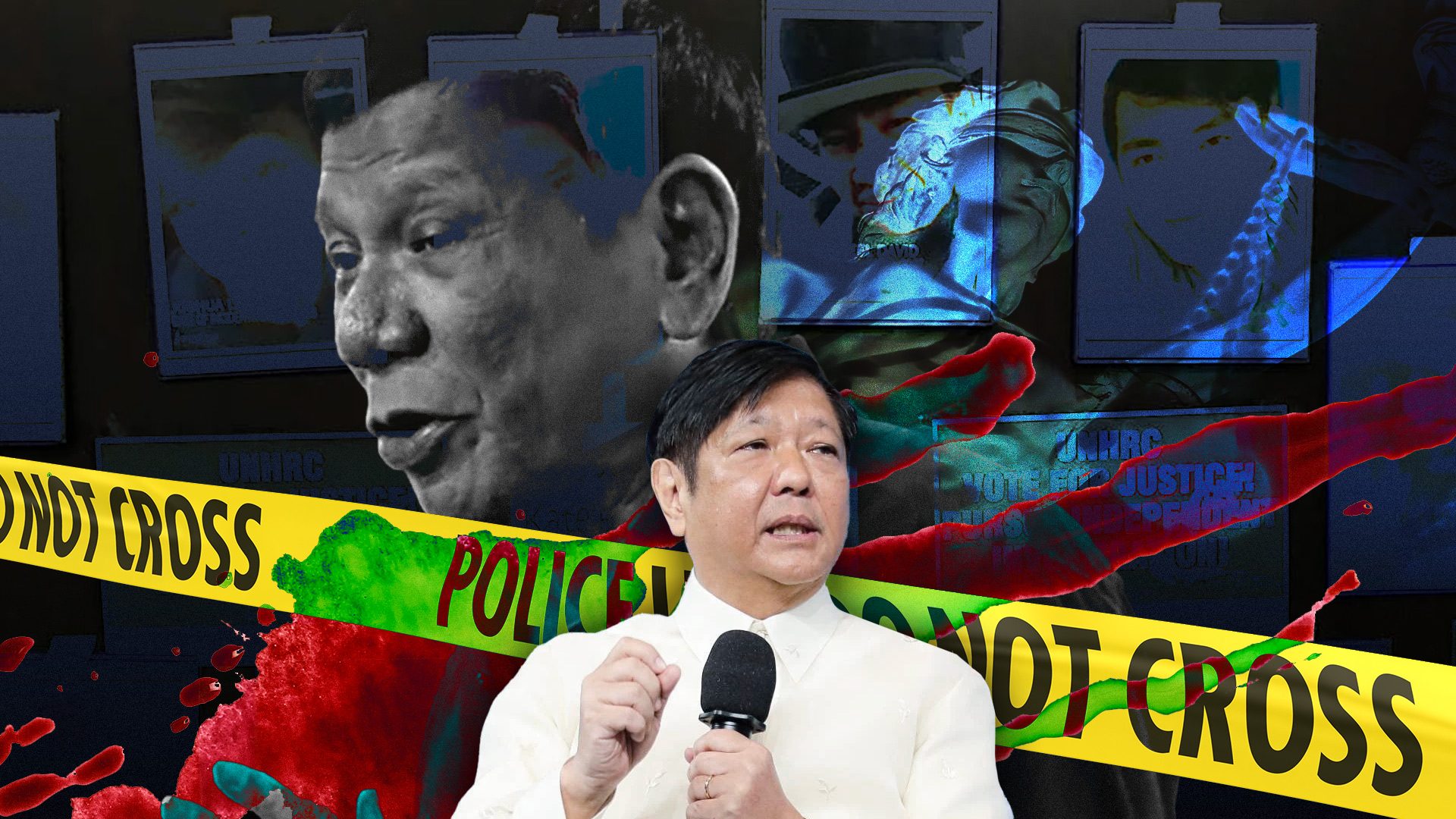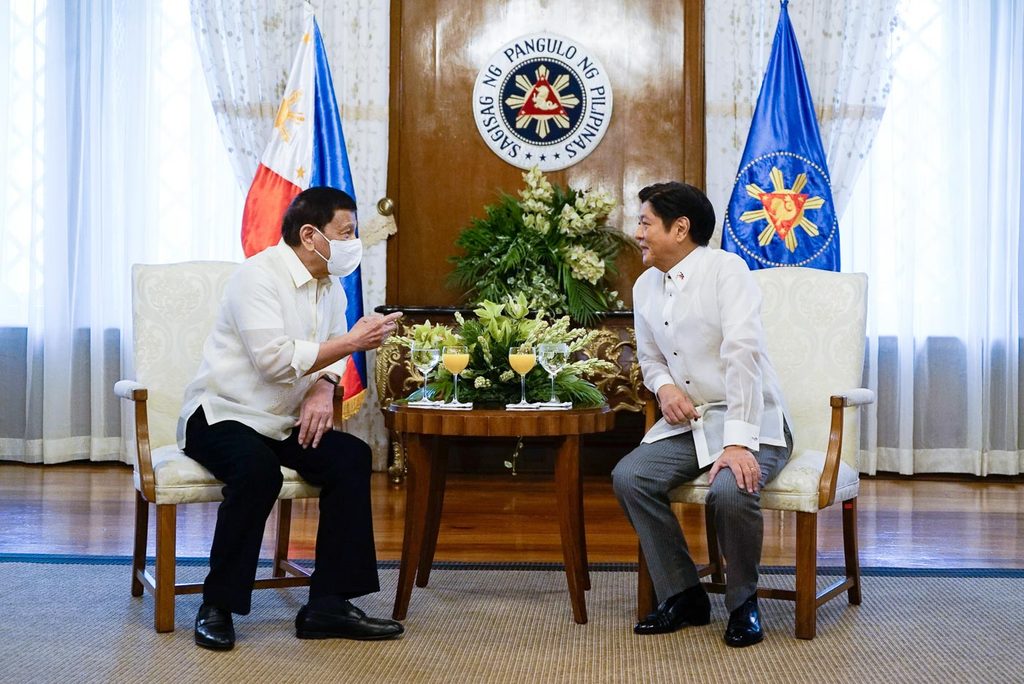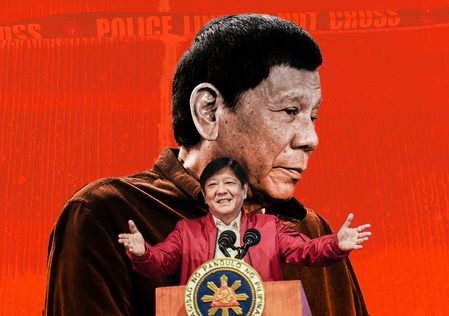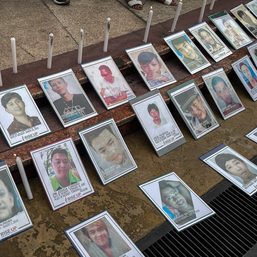SUMMARY
This is AI generated summarization, which may have errors. For context, always refer to the full article.

READ: Part 1 | A mother thinks the worst is over after Duterte. Then her son is killed under Marcos.
Last of 2 parts
AT A GLANCE
- Drug-related killings continue under the administration of Ferdinand Marcos Jr. but obtaining official numbers from the government remains difficult.
- In a response to Rappler’s freedom of information request, the Philippine National Police said “seven (7) people [were] killed for illegal drugs from June 2022″ to April 2023. But the Dahas project monitored at least 100 killed in anti-illegal drug operations as of May 31, 2023, while then-PNP chief Rodolfo Azurin Jr. in November 2022 said that 46 people were already killed by police.
- While the violence de-escalated under Marcos, political scientist Sol Iglesias said the administration’s biggest complicity is institutionalizing impunity by continuing to shield the crimes committed under Duterte.
MANILA, Philippines – Silence was golden for President Ferdinand Marcos Jr. when it came to the bloody legacy of his predecessor Rodrigo Duterte – at least for the most part of the 2022 presidential campaign and the eventual first few months of his presidency.
The second Marcos president, after all, benefited from the political power of the foul-mouthed former Davao City mayor who ordered the slaughter of thousands of Filipinos in the name of his anti-illegal drugs campaign. He also ran, and won, with then-presidential daughter Sara Duterte as his vice president.
But in May 2023, in an event thousands of kilometers away from the Philippines, Marcos acknowledged the killings during the Duterte administration. Speaking before the Center for Strategic and International Studies, he said that a “focus on enforcement” resulted in “abuses by certain elements in the government.”
It was the most explicit statement Marcos has made on the widespread killings committed during Duterte’s war on drugs, even as he refused to assess the campaign’s entirety. In previous instances, like in September 2022, he had only talked about taking on a different approach because enforcement “only gets you so far.”
In contrast, Marcos’ Interior Secretary Benjamin “Benhur” Abalos Jr. said during the early days of the administration that the “war against drugs will be as intensive as before on the basis of my oath as a public official in accordance with the Constitution.”
Almost one year into the Marcos administration, how does the situation compare to the violence under Duterte? There are different ways to look into this. First is to assess the landscape using data.
There have been no consistent data releases under the Marcos administration covering drug-related killings, unlike during his predecessor’s time when the Philippine Drug Enforcement Agency (PDEA) and the Philippine National Police (PNP) publicly uploaded numbers online, specifically through the #RealNumbersPH platform on Facebook.
It is because of this “transparency” that we know that police claimed to have killed at least 6,252 people during anti-illegal drug operations between July 2022 and May 31, 2022. The death toll is estimated to rise to between 27,000 to 30,000 if victims of extrajudicial killings are included, according to independent monitoring by human rights groups.
Getting official government data on drug-related killings under Marcos has so far been difficult. The numbers provided by the PNP in the scant times that requests were successful are also significantly lower than those documented by other groups.
Rappler has submitted two freedom of information (FOI) requests to the PNP for the number of individuals killed in anti-illegal drug operations. The PNP responded to the April 27 request on May 2. The information provided was in the form of a powerpoint presentation created by the PNP Drug Enforcement Group, the unit that leads the anti-illegal drug efforts of the national police.
The file contained only specific cases of “drug personalities [who] died in police operations (DIPO)” and killed from January 2022 to April 2023. Subtracting the number of those killed before Marcos took office, the PNP presentation shows only two incidents.
Rappler again submitted another FOI request on May 5, this time to PDEA. But the agency referred our request to PNP, which responded on May 9 with a similar powerpoint presentation.
This time, however, the last slide included plain text that said “seven (7) people killed for illegal drugs from June 2022 to present.” PNP DEG, in a response to a separate email, reiterated the same number.
Rappler reached out to the PNP’s Public Information Office through both email and a text message to spokesperson Police Colonel Jean Fajardo on Tuesday, June 6, to confirm this information. We have yet to receive a response as of publication.
If we go by the “seven people killed for illegal drugs,” this death toll is lower than what was provided by the same agency in November 2022. In a forum organized by the Foreign Correspondents Association of the Philippines, then-PNP chief Rodolfo Azurin Jr. said that 46 people were killed in anti-illegal drug operations – 32 killed by police and 14 by PDEA agents.
This number is also significantly lower than the death toll monitored by Dahas, a project of the University of the Philippines Diliman’s Third World Studies Center.
From July 1, 2022 to May 31, 2023, at least 100 people were killed by state agents in anti-illegal drug operations alone. The number rises to 132 to include victims killed not in anti-illegal drug operations but later found to have links to illegal drugs.
This is part of a bigger death toll of at least 309 drug-related killings within the same period, to include those killed by non-state agents and unidentified perpetrators, based on the project’s monitoring. At least 134 killings were committed from January 1 to May 31, 2023 alone, with 60 carried out by state agents.
The Commission on Human Rights (CHR) was also able to document and investigate 13 cases of killings in government operations. The constitutional body mandated to probe state abuses, however, clarified that this number does not “reflect the total number of alleged drug-related extrajudicial killings” it is investigating, and that CHR regional offices may have more numbers.
Human rights lawyer Catherine Lopez, research and policy development coordinator at Initiatives for Dialogue and Empowerment through Alternative Legal Services (IDEALS), said the lack of transparency and withholding of information appears to be a “tactic” of the Marcos administration.
By not releasing data consistently, it’s as if the government is taking on an “out of sight, out of mind” approach where continued killings are not discussed.
“It’s our right to have these records so why does it seem like we have to beg for them to release these information that we have a right to access in the first place?” she told Rappler. “That’s not acceptable.”
As an organization, IDEALS has helped document cases of drug war killings under Duterte. Lopez said that there’s not much difference between the two administrations when it comes to challenges faced by families in obtaining documents and reports related to their slain loved ones.

Marcos’ crime of impunity
Based on the numbers, it is safe to say that there’s a de-escalation of killings. The situation during the first year of Marcos is not as violent as Duterte’s who, by his 6th month in office in January 2017, already saw more than 2,500 deaths in police operations alone.
Still, the killings continue despite rhetoric from Marcos that he will try a less violent approach, unlike his predecessor. In the poorest communities in Metro Manila, families that Rappler spoke with reported not much change. There are still people killed by the police, but they’ve noticed that significantly more are being killed by unidentified individuals.
Families who have lost loved ones during Duterte’s reign of violence continue to fear that they will lose more under Marcos. And these are on top of existing harassment and intimidation they experience as they try to seek justice.
Carlos Conde, senior researcher for Human Rights Watch (HRW), tagged the disconnect between Marcos’ statements and the situation on the ground as a “political balancing act” as he tries to appease the international community. These include foreign governments that Duterte has demonized, if not outright insulted, during his term as president.
“Marcos is doing the barests of bare minimums, because Duterte set the bar so low,” Conde said. “My sense is that the low-level violence serves a purpose within the police, but it is not outrageous enough to put Marcos on the spot.”
But at the same time, he believes that Marcos will probably not make a “dramatic turn” by either ending the drug war nor even launching a genuine investigation into the killings.
Is it because Marcos is as hungry for blood as Duterte, the man accused of expanding nationwide the operations and style of the notorious Davao Death Squad (DDS) that killed thousands in his turf, Davao City? Probably not.
If Marcos has his way, Conde said, he probably would want the violence to stop “because the drug war is not his fight.”
“His main motivation is to rehabilitate the Marcos name and for them to keep their riches, but he doesn’t want to offend Duterte and his base, which Marcos still counts on for support,” Conde said, adding that it’s best to watch out for what happens “nearer to the 2028 elections.”
Marcos, however, is not at all blameless and is not just caught between a rock and a hard place.
Sol Iglesias, assistant professor of political science at the University of the Philippines Diliman, said that the biggest issue here is impunity that continues to be promoted under the Marcos administration.
While there is decreased violence, Marcos is still liable for not ensuring justice for the thousands of victims of Duterte’s war on drugs.
“When a successive government continues to shield the crimes or potential crimes of the previous administration, that’s already institutionalizing impunity,” she said. “That is the biggest complicity of the Marcos administration [and] it’s something that we just simply can’t ignore because the subsequent president has a duty to the victims.”
The Marcos government may have taken steps to cleanse the ranks of the PNP, including those alleged to have links to illegal drugs, but it is yet to hold accountable cops, including Duterte himself, who killed, or allowed the killing of, individuals.
Only a few have been convicted in drug war-related killings, including the police involved in the deaths of 17-year-old Kian delos Santos, Carl Angelo Arnaiz, and Reynaldo “Kulot” de Guzman.
If Marcos was serious about giving justice, his administration would have launched a “massive expansion of investigations” and also would not oppose developments at the International Criminal Court (ICC), which is presently investigating possible crimes against humanity committed under Duterte.
“We should be very skeptical and wary of [Marcos’] rhetoric and sort of positioning itself as very different from the violence of Duterte because all the underlying root causes of the violence and facilitating factors of the violence are being aided and abetted by the Marcos administration,” Iglesias said.
Moving forward
As the strategy of Marcos’ anti-illegal drug campaign remains vague at the very least, it is important that there will be no let-up in the monitoring of drug-related killings.
Continuity requires dedication not just from one group, but a consolidation of efforts across civil society organizations and the media. But what’s more important, according to Lopez of IDEALS, is giving adequate support to monitoring done by communities themselves, especially in the face of intense intimidation from state agents.
Many human rights groups Rappler spoke with over the years count members of communities as always the first ones to record and report incidents of killings that are happening around them.
“Give [groups] visibility because visibility can secure them,” Lopez said. “Help them be more physically and psychologically secure, they can move freer if they know there’s support from the people.”
While documentation contributes to history, she cautioned that it unfortunately cannot measure the extent of the damage done. While the death toll is heavily reported on, the impact on children and future generations, including the normalization of violence, has yet to be fully seen.
“What kind of generation is now growing? We are creating a generation of people who are numb to the violence, who think that this is normal,” she said.
As the human rights situation should be monitored under Marcos, the quest for justice for the thousands killed under Duterte continues. All eyes are on the International Criminal Court as it is expected to decide on the appeal lodged by the Philippine government against the resumption of the probe into the drug war killings.
As the public awaits the next ICC developments, other steps taken should also ensure that the impunity under Marcos and Duterte are not swept under the rug in the face of renewed or invigorated international relations.
One of the biggest examples of this is the upcoming expiration of the Generalized Scheme of Preferences Plus (GSP+), or trade perks enjoyed by the Philippines from the European Union. At the center of this scheme is the obligation to uphold human rights standards. Groups both here and abroad are calling on the EU Commission to not renew the Philippines’ status.
While there is still no solid indication about the fate of the country’s trade perks with the EU, there are signs that foreign governments are pleased with Marcos.
“More than castigating Marcos for not doing much as far as human rights is concerned, we should call out the international community for being content with tokenistic approaches, for doing so little and being happy with it,” HRW’s Conde said.
Ultimately, Duterte’s violent policies and disregard for human rights make it easier for future administrations to unleash their own brand of terror in the Philippines. According to political scientist Iglesias, failing to address the impact of Duterte will just make the cycle go on forever.
“Without the genuine restoration of respect for human rights, including in the form of justice for victims, the risk in our country is that the bloody six years could happen again, whether or not under the Marcos administration, but maybe in the future,” she said. – Rappler.com
Add a comment
How does this make you feel?




![[WATCH] Bamban POGO scandal: There’s a bigger fish than Alice Guo](https://www.rappler.com/tachyon/2024/07/inside-track-tcard-bamban-pogo.jpg?resize=257%2C257&crop=435px%2C0px%2C1080px%2C1080px)
![[Vantage Point] China’s silent invasion of the Philippines](https://www.rappler.com/tachyon/2024/07/TL-china-silent-invasion-july-16-2024.jpg?resize=257%2C257&crop=318px%2C0px%2C720px%2C720px)

![[The Slingshot] Lito Patay’s 4 hours and 38 minutes of infamy](https://www.rappler.com/tachyon/2024/07/Lito-Patay-4-hours-infamy-July-19-2024.jpg?resize=257%2C257&crop=233px%2C0px%2C720px%2C720px)

![[The Slingshot] A Duterte and Bato cop named Patay](https://www.rappler.com/tachyon/2024/06/tl-lito-patay.jpg?resize=257%2C257&crop=322px%2C0px%2C720px%2C720px)
![[In This Economy] Marcos’ POGO ban is popular, but will it work?](https://www.rappler.com/tachyon/2024/07/thought-leaders-marcos-pogo-ban.jpg?resize=257%2C257&crop=255px%2C0px%2C720px%2C720px)
![[Rappler Investigates] POGOs no-go as Typhoon Carina exits](https://www.rappler.com/tachyon/2024/07/newsletter-graphics-carina-pogo.jpg?resize=257%2C257&crop=424px%2C0px%2C1080px%2C1080px)






![[EDITORIAL] Sorry Arnie Teves, walang golf sa kulungan](https://www.rappler.com/tachyon/2024/03/animated-arnie-teves-arrest-carousel.jpg?resize=257%2C257&crop=310px%2C0px%2C720px%2C720px)



![[Just Saying] SONA 2024: Some disturbing points](https://www.rappler.com/tachyon/2024/07/TL-marcos-sona-points-july-23-2024.jpg?resize=257%2C257&crop=335px%2C0px%2C720px%2C720px)








![[OPINION] Rodrigo Duterte and his ‘unconditional love’ for China](https://www.rappler.com/tachyon/2024/04/rodrigo-duterte-xi-jinping-august-2019.jpeg?resize=257%2C257&crop=91px%2C0px%2C900px%2C900px)


There are no comments yet. Add your comment to start the conversation.